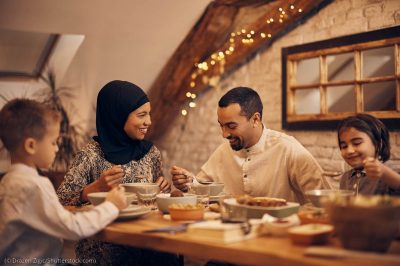Ramadan, a sacred month observed by Muslims worldwide, holds unique significance in the United States. With a diverse population of American Muslims tracing their ancestry to various corners of the globe, Ramadan traditions in the U.S. are a tapestry of cultures and customs.
Many immigrants recall their first Ramadan experiences in the U.S. as a time of learning and adaptation. Rizwan Jaka, a member of the All Dulles Area Muslim Society (ADAMS) in the Washington area, reflects on the rich diversity within his community, with roots spanning India, Pakistan, Mexico, and beyond. ADAMS hosts daily iftar meals featuring menus rotating among South Asian, Middle Eastern, African, American, and other cuisines, reflecting the cultural mosaic of its members.
Community Fellowship
For Muslims like Jaka, Ramadan encompasses fasting, prayer, Quran recitation, charity, good deeds, and communal iftar gatherings. It’s a time for spiritual growth and a period of community fellowship. The sense of togetherness during Ramadan strengthens bonds and fosters unity among American Muslims.
Samira Jaweed, an immigrant from Pakistan, shares her perspective on the differences between Ramadan celebrations in her homeland and the U.S. While her family observed Ramadan mostly at home in Pakistan, she now embraces Ramadan activities centered around the Islamic Center of Greater Cincinnati. Jaweed acknowledges the challenge of adjusting to daylight saving time, which affects fasting hours, particularly during summer when sunset occurs later in the evening.
Also Read: World Health Day 2024 – My Health, My Right
Tariq Rasheed, another Indian immigrant, cherishes the inclusive nature of Ramadan activities in the U.S. As an imam at the Islamic Center of Orlando, Florida, Rasheed fondly recalls his first Ramadan in the U.S. as a time of profound connection within the Muslim community. The mosque served as more than just a place of worship; it was a hub for social gatherings, sports events, and interfaith iftars that fostered friendships across religious lines.
Today, Rasheed organizes interfaith iftars, inviting members of local churches and synagogues to participate. He emphasizes that these events are integral to building bridges of understanding and solidarity among diverse communities.
Ramadan as a Celebration of Unity and Inclusivity
Ramadan in America embodies the spirit of inclusivity, diversity, and community. It is a time when individuals from various backgrounds come together to celebrate shared values of faith, compassion, and unity, reflecting the essence of the American mosaic.
Political Analyst | M.Phil. Scholar







